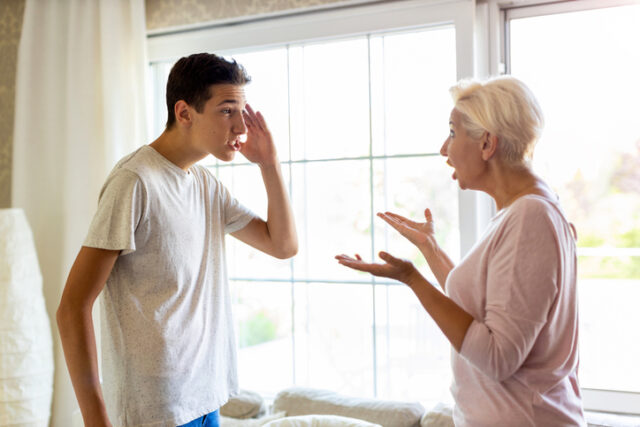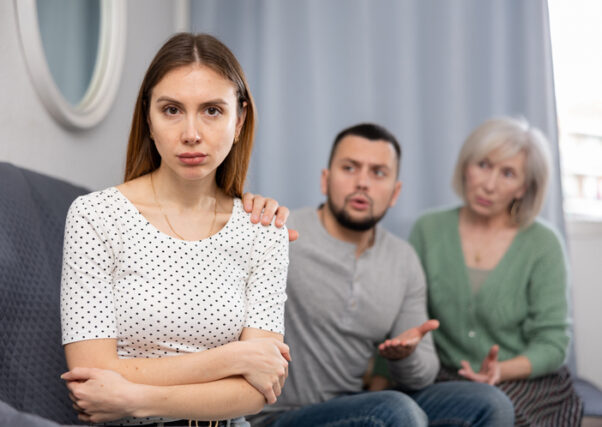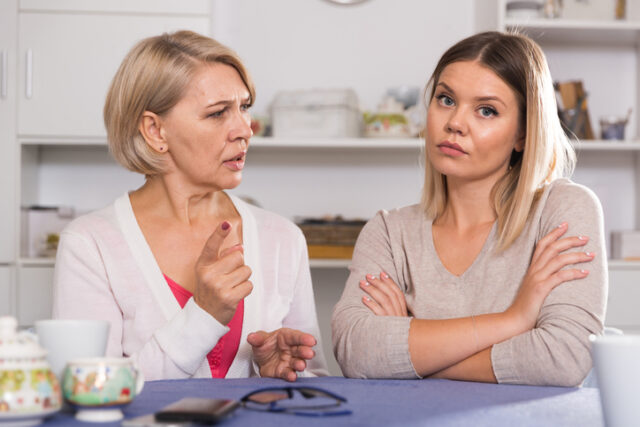It’s great to have people in your life who care, but sometimes, that care turns into something a little too close for comfort.

It’s not always dramatic or controlling, and it usually comes from a good place. Still, when someone you love starts inching too far into your space emotionally, physically, or mentally, it can leave you feeling drained or irritable without knowing why. Here’s how you know that someone in your life needs a refresher on boundaries so that they can step back a bit and start respecting yours a bit more.
1. You feel relieved when they cancel plans.

It’s normal to enjoy alone time, but if you find yourself secretly hoping they’ll back out just so you can breathe, it might be a sign. That low-key relief can reveal just how emotionally crowded you’ve been feeling. When someone’s presence starts to feel like pressure instead of connection, it usually means your boundaries need some attention, even if they’re not doing anything obviously wrong.
2. They check in constantly and expect a reply.

There’s a difference between staying connected and being on-call. If your phone buzzes constantly with messages like “Where are you?” or “Are you mad at me?” even when you’re just living life, it can start to feel intrusive. It’s okay to need space between conversations. If they struggle to give you that breathing room without panic or guilt, their care might be tipping into overreach.
3. They want to be involved in everything.

It’s lovely when someone takes interest in your life… until it feels like they’re inserting themselves into every decision, plan, or personal project. Suddenly, your space starts to feel more like a shared account than a solo experience. Whether it’s wanting a say in your friendships, work life, or downtime, that constant involvement can quietly destroy your independence. What starts as support can start to feel like surveillance.
4. They take it personally when you need alone time.

If every request for space is met with hurt feelings, guilt-tripping, or confusion, that’s a red flag. Needing time alone doesn’t mean you’re pulling away, it just means you’re human. Someone who means well might interpret it as rejection, but that doesn’t mean you have to give up your boundaries to make them feel better. Space isn’t unkind; it’s healthy.
5. You’re starting to edit yourself around them.

If you find yourself avoiding certain topics, hiding your plans, or sugar-coating your feelings to keep the peace, look a bit closer. That kind of editing is usually a sign you’re feeling watched, or overly responsible for their emotions. After a while, it eats away at your authenticity. You shouldn’t have to shrink or over-explain just to protect someone else’s comfort all the time.
6. They need to be included, even when it’s not about them.

Sometimes people crowd your space by making your moments feel like theirs. Maybe they expect to be invited to every event or get upset when they’re not the centre of a conversation. It’s not that they’re trying to take over, but if you feel like you can’t have your own things without them tagging along emotionally or physically, that’s a sign your space is getting blurry.
7. You feel emotionally exhausted after spending time together.

Love isn’t supposed to leave you drained. If you consistently walk away from interactions feeling tired, over-stimulated, or just flat, it might not be about what was said. In fact, it might be about how much energy you’re using to manage the dynamic. Emotional crowding often doesn’t look aggressive. It can be soft, even sweet, but the weight of someone always needing something from you adds up fast.
8. They ask for your input on things that aren’t your job.

Being asked for help is normal. Being turned into someone’s emotional advisor, daily sounding board, or stand-in therapist every day? That’s something else. When someone leans too heavily on you for every choice, mood shift, or meltdown, it blurs the line between closeness and overdependence. That imbalance can quietly gnaw away at your own capacity.
9. You’ve stopped checking in with your own needs.

When someone’s constantly in your orbit, it’s easy to fall into reactive mode, always responding, fixing, adjusting. After a while, your own needs can feel secondary or even invisible. If you’re not sure what you want anymore, that’s a pretty loud sign. A crowded emotional space leaves very little room for self-awareness, and eventually, that disconnect catches up with you.
10. They make every emotion a shared one.

If you’re sad, they’re crushed. If you’re anxious, they’re panicking. At first, it might feel like empathy, but as time goes on, it starts to feel like you can’t feel anything privately. When your emotional state becomes someone else’s emotional rollercoaster, it can leave you feeling hyper-aware and responsible in a way that’s quietly overwhelming.
11. You find yourself needing more recovery time than usual.

After being around them, you don’t just feel tired, you feel like you need to recharge longer than usual. It’s not always obvious at first, but your body and mind start to signal that something’s off. Emotional crowding isn’t just about their actions. It’s about how it affects your nervous system. And if you’re constantly in recovery mode after time together, that’s worth noticing.
12. They frame everything as “just caring too much.”

When you try to set boundaries, they might say things like “I’m just worried” or “I care too much, I guess.” It sounds sweet, but it can also be used to shut down the conversation or make you feel guilty for asking for space. Caring isn’t measured by how close someone gets; it’s measured by whether they respect your autonomy. Love without boundaries stops being love and starts being pressure.
13. You’ve caught yourself resenting them, even if you don’t want to.

When someone means well, it feels wrong to feel annoyed by them, but resentment is one of the clearest signs your emotional space is being crossed too often. You may not even realise it until it spills out in snappy comments or withdrawal. You don’t need to feel guilty for this. It’s your mind trying to get your attention. If resentment is creeping in, it means something needs adjusting, and it doesn’t make you ungrateful or unkind to say so.
14. You miss the version of you that felt lighter.

Sometimes the best indicator isn’t about them—it’s about you. If you feel heavier, more irritable, or less like yourself around them than you used to, your space might be more crowded than you realised. That emotional weight builds slowly, but once you name it, you can start to reclaim some of that space. Loving someone doesn’t mean carrying their presence 24/7. You’re allowed to breathe again.




